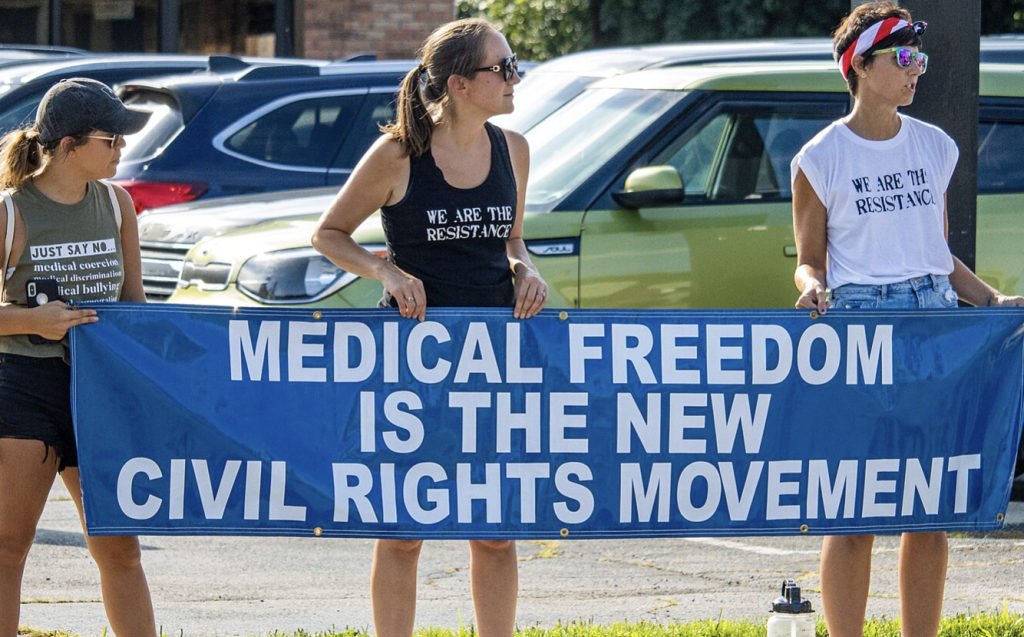Listen to the article
RFK Jr.’s health freedom movement has sparked both support and skepticism across America’s political landscape. The Make America Healthy Again (MAHA) coalition, championed by Kennedy, promotes a philosophy that individuals should have the right to make their own healthcare decisions without interference from public health authorities.
“This growing, nonpartisan health freedom movement is pushing for bold, sweeping changes to a system that many believe is long overdue for reform,” says Josh Axe, a prominent alternative medicine advocate who supports MAHA. He suggests the movement’s reach extends beyond political boundaries: “Whether you realize it or not, if you’ve ever questioned a prescription, worried about food safety, or felt unheard in a medical office, you’re already part of it.”
The concept of health freedom has found resonance with Americans across the political spectrum. Even those typically opposed to Kennedy’s broader agenda—such as scientists advocating for universal healthcare—often frame their arguments in similar rights-based language, positioning access to medical care as a fundamental human right.
However, critics argue that beneath the liberty-focused rhetoric lies a more complex agenda. They contend that Kennedy and his supporters selectively apply their principles, advocating for freedom of choice only when it aligns with their preferences. Critics point to recent actions as evidence of this inconsistency.
Under Kennedy’s leadership, the FDA recently modified federal recommendations for COVID-19 vaccines—a decision some experts warn could restrict access to these vaccines even for individuals who might benefit from them. Critics also reference Kennedy’s earlier career, citing footage where he apparently advocated for the imprisonment of business leaders he identified as proponents of climate change misinformation—a stance that appears to contradict his current liberty-focused messaging.
This apparent contradiction raises significant questions about the consistency of the health freedom platform. Is health freedom a legitimate concept that has been co-opted or inconsistently applied by MAHA activists? Or is the entire concept fundamentally flawed?
The debate highlights the complex intersection of personal liberty, public health policy, and political messaging in America’s healthcare landscape. On one hand, the principle that individuals should have agency in their healthcare decisions resonates broadly across ideological lines. On the other hand, critics question whether this principle is being selectively applied to advance particular agendas rather than as a consistent philosophical position.
The implications extend beyond theoretical debates about freedom. Real-world policy decisions affecting vaccine availability, public health recommendations, and healthcare access hang in the balance. As federal agencies make decisions under new leadership, these philosophical tensions manifest in concrete policies that affect millions of Americans.
Public health experts note that navigating the balance between individual choice and collective wellbeing has always been challenging in healthcare policy. The COVID-19 pandemic brought these tensions into sharper focus, with debates about vaccine mandates, mask requirements, and other public health measures often framed in terms of personal freedom versus community responsibility.
The health freedom movement continues to gain traction, particularly among constituencies skeptical of conventional medicine or concerned about pharmaceutical industry influence. Yet mainstream medical organizations remain concerned that some health freedom positions could undermine evidence-based medical practices or public health initiatives proven to save lives.
As the movement evolves under Kennedy’s leadership, the medical community, policymakers, and the public will continue to scrutinize whether “health freedom” represents a principled stand for individual rights or a selective application of liberty rhetoric. The outcome of this debate will likely shape healthcare policy discussions for years to come.
Fact Checker
Verify the accuracy of this article using The Disinformation Commission analysis and real-time sources.




12 Comments
Looks like the ‘health freedom’ movement is tapping into broader frustrations with the medical establishment. I can understand the appeal, but concerned about the spread of misinformation and potential risks to public health. Need balanced solutions.
Interesting to see how the ‘health freedom’ framing has gained traction across the political spectrum. Speaks to the deep-seated desire for autonomy in healthcare decisions. But we also can’t ignore the public health implications. Nuanced issue indeed.
The article raises important points about the complexities involved in balancing individual liberty and public welfare. I’ll be following this debate closely to see how it evolves and what implications it may have for the industries I follow.
Agreed, this is a nuanced issue without easy answers. Thoughtful, evidence-based policymaking will be crucial as this debate continues.
As an investor in mining and energy stocks, I’m curious how this debate over ‘health freedom’ could impact commodity markets and the industries I follow. Potential shifts in regulation, consumer behavior, and political winds could have ripple effects.
This is a complex issue without easy answers. I can see valid arguments on both sides – personal liberty vs public health. Curious to hear more balanced perspectives on how to balance these competing priorities.
You’re right, it’s a nuanced debate. I think it’s important to listen to diverse views and look for common ground, rather than just taking hardline stances.
As an investor, I’ll be watching this debate closely to understand how it might impact commodity markets and the industries I follow. Potential shifts in regulation, consumer behavior, and political winds could have ripple effects.
The article highlights the complex interplay between individual liberty and public health. I can appreciate the desire for personal autonomy, but also see the importance of evidence-based policy to protect collective wellbeing. Thoughtful, balanced solutions are needed.
The ‘health freedom’ movement raises important questions about individual rights and the role of government. But I worry some groups are using it to spread misinformation and undermine public health efforts. Need to look closely at the facts and motivations.
Agreed, it’s crucial to separate legitimate concerns about personal choice from politically-motivated disinformation campaigns. Thoughtful, evidence-based policy is needed here.
Fascinating to see how the ‘health freedom’ framing is resonating across the political spectrum. Speaks to the deep-seated human desire for autonomy in healthcare decisions. But we can’t ignore the public health implications either. Tricky balance.